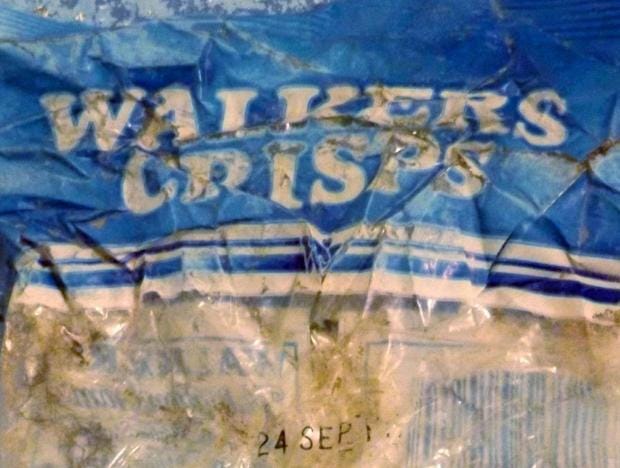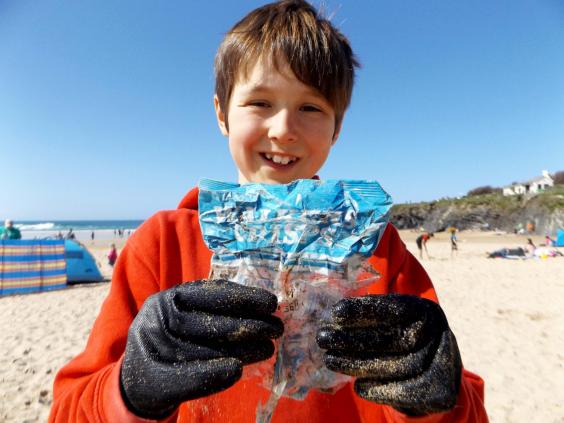Futures Forum: Plastic and business
On the one hand, business is to blame:
Futures Forum: Plastic pollution and the invention of 'litter' > or, how the packaging industry avoided responsibility for creating the problem in the first place
On the other, business can be very effective in doing something about it:
Futures Forum: Taking the plastic out of your teabag
Another iconic piece of British food and drink is being targetted - by a petition from 38 Degrees:
We eat more crisps than any other nation on earth. [1]
But right now almost all the crisps sold in the UK are in non-recyclable plastic packaging which doesn’t rot. That means millions of crisp packets end up filling landfills, littering our parks and clogging up our oceans. [2]
Walkers Crisps sell more than half the crisps we eat. [3] If they switched to recyclable or biodegradable packets it’d make a huge difference for our environment and wildlife. That’s why Geraint, set up a petition on the 38 Degrees website calling on Walkers to lead the way and switch their packaging. [4]
Walkers are a company that really care about how people see them. If tens of thousands of us demand that Walkers Crisps switch to plastic-free packaging, it could give them the push they need to make the change. A huge petition landing on the boss’ desk would send a message from loyal customers they couldn’t ignore.
Most of us probably had no idea that the nation’s favourite snack was adding to the plastic crisis. On average we eat 150 bags each a year - that’s a lot of plastic waste! [5] But Walkers has the answer - they’ve already developed plastic-free packets but are yet to make the change. [6] Now we’ve got the chance to pile on the pressure and make sure the country’s favourite crisp company does the right thing.
From plastic cotton bud sticks to plastic in our teabags, 38 Degrees members have a history of taking on big businesses on plastic use - and winning. [7] Just last month PG Tips said they are removing plastic from their tea bags after over 100,000 of us put pressure on them. [8] And Odeon and other cinemas are currently under pressure from over 150,000 of us to stop using plastic straws. [9]
If thousands of us tell Walkers to do the right thing, we can pressure them into being the first to make the switch.
SIGN THE PETITION
David, Cathy, Robin, Mike and the 38 Degrees team
NOTES:
[1] The Guardian: Crisps: a very British habit:
https://www.theguardian.com/lifeandstyle/2010/sep/01/crisps-british
[2] Marine Consevration Society: Why go plastic bag free:
https://www.mcsuk.org/downloads/pollution/beachwatch/Why%20go%20plastic%20bag%20free.pdf
[3] bakery and snacks: UK salty snacks: Own label scoops market share from Pringles, Walkers and Kettle:
https://www.bakeryandsnacks.com/Article/2017/11/03/UK-salty-snacks-Own-label-scoops-market-share-from-Pringles-Walkers-and-Kettle
[4] 38 Degrees: Make crisp packets recyclable:
https://you.38degrees.org.uk/petitions/recyclable-crisp-packets
[5] See Note 1
[6] Telegraph: Biodegradable crisp packets 'too noisy':
https://www.telegraph.co.uk/foodanddrink/foodanddrinknews/8045361/Biodegradable-crisp-packets-too-noisy.html
[7] 38 Degrees: Cotton bud success!:
https://home.38degrees.org.uk/2017/01/10/cotton-bud-success/
[8] 38 Degrees: PG Tips – we won!:
https://home.38degrees.org.uk/2018/02/28/pg-tips-won/
[9] 38 Degrees: Make plastic drink straws obsolete in cinemas:
https://you.38degrees.org.uk/petitions/make-plastic-drink-straws-obselete
Home - 38 Degrees
A story this weeks makes the point very clear:
Boy finds 30-year-old packet of Walkers crisps
Discovery highlights problem of plastic pollution in our oceans, campaigners say
Tom Tracey 7 hours ago

The packet of Walkers crisps is thought to date from the 1980s SWNS
A 30-year-old packet of Walkers crisps discovered by a boy washed up on a Cornwall beach highlights the growing problem of plastic pollution in our oceans, campaigners say.
Laurence Miller, 10, was part of a group of beach-cleaning volunteers when he discovered the largely intact bag of cheese and onion flavoured crisps on Sunday.
The schoolboy was doing the litter pick when he found the bag three times his age at Treyarnon Bay, in Padstow, Cornwall.
READ MORE
Plastic pollution killed sperm whale found dead on Spanish beach
Plastic pollution in sea set to treble in a decade, warn scientists
Despite not having a printed date still visible on the packet, researchers estimate it was produced during the 1980s.
Laurence, from Wadebridge, said: “We were doing a litter pick and I was walking up the stream a bit where the river meets the sea and I found it just embedded in the side of the bank.
A 30-year-old packet of Walkers crisps discovered by a boy washed up on a Cornwall beach highlights the growing problem of plastic pollution in our oceans, campaigners say.
Laurence Miller, 10, was part of a group of beach-cleaning volunteers when he discovered the largely intact bag of cheese and onion flavoured crisps on Sunday.
The schoolboy was doing the litter pick when he found the bag three times his age at Treyarnon Bay, in Padstow, Cornwall.
READ MORE
Plastic pollution killed sperm whale found dead on Spanish beach
Plastic pollution in sea set to treble in a decade, warn scientists
Despite not having a printed date still visible on the packet, researchers estimate it was produced during the 1980s.
Laurence, from Wadebridge, said: “We were doing a litter pick and I was walking up the stream a bit where the river meets the sea and I found it just embedded in the side of the bank.

Campaigners say the discovery highlights the issue of the environmental impact of plastic in our oceans (SWNS)
“It looks quite different to what the crisps look like now. It’s probably the strangest thing I’ve found, I found lumps of palm oil in blocks and they get washed up sometimes, they are quite weird to find.”
His dad Simon, 45, said Laurence had been interested in conservation since doing an five-mile bike ride for a hedgehog charity last summer and is a member of Cornwall Wildlife Trust.
The photographer, said: “They’re really keen to do anything like that. There’s been a big push with the plastics in the ocean and its brilliant so many people are realising it.”
The discovery comes less than three months after a crisp packet from 1997 was found on a neighbouring beach, Constantine Bay.
Rob Stevenson, who runs the volunteer beach-cleaning group, said: “Laurence was really enthusiastic, in fact they all were. The youngsters are so enthused and excited about it - I don’t like to say it but some of the plastic things that are found can be quite exciting to find.

Laurence Miller was part of a group of beach-cleaning volunteers when he found the packet (SWNS)
“The crisps are more than three times older than him, it really demonstrates just what the problem of using plastics are. Some of them will stay in the sand dunes if people have dropped them and the wind blows the sand over and they get covered; stuff floats around in the sea and gets battered; some may be in a sand dune for a long time, fall into the sea and come back in again.
“We can’t say how long the plastic has been exposed for or where it’s been, but it goes to show if you litter something somewhere, it does generally end up in the sea. Plastic is a fantastically durable product and it shows in the last 20 or 30 years how much the problem has escalated.
“We think the packet dates from the 1980s as on the back it says ‘The Valuation Game’. We think that was a promotion they ran as a sort of football thing, we found a guy selling ‘The Valuation Game’ book on eBay and he said this is about 30 years old."
Mr Stevenson, who lives in Padstow, started the project last year with his daughter Emily, who is studying marine biology at Plymouth University, after watching the film ‘A Plastic Ocean’. He added: “You obviously see turtles and other marine species with plastic bags that they have ingested, you know this plastic will never go away.
READ MORE
Manchester river has worst microplastic pollution ever recorded
Chancellor to ask public for ideas to curb plastic pollution
It's not just Bali that has a 'sea of plastic'
Businesses drastically under-report plastic waste, research finds
As marine plastic litter mounts, what's the evidence on harm?
"It just breaks down into smaller, smaller and smaller pieces – a crisps packet could end up being thousands of tiny pieces that lots of other marine animals are going to ingest. That’s the worry people don’t appreciate, that it doesn’t stay as a whole packet over the course of 50, 60 years - the same with single-use bottles.
“Walkers is owned by Pepsi, that organisation is responsible for all those single use bottles, crisp packets and even if they say by 2025 they will change their packaging, that’s seven years’ worth of crisp packets that could potentially be doing so much harm.
“Why can’t manufactures fall into line quickly - the technology is out there, there are home-combustible food wrappers available now. If alternatives are available now that are more healthy and don’t use plastic packaging, the tide should literally turn.”
A spokesperson for Walkers said: "At Walkers, we take the problem of litter and waste very seriously. We include on-pack labels to encourage our consumers to dispose of their waste responsibly and are also working towards the goal of designing all our packaging to be recyclable, compostable or biodegradable by 2025.
"Last year, we also became a founding member of the Ellen MacArthur Foundation’s New Plastics Economy, an ambitious, three-year initiative to help create a plastics system that works.”
The New Plastics Economy project is described as aiming to change the way companies and people "make, use and reuse plastics".
Walkers was founded in Leicester in 1948 and its crisp production plant in the city is the largest in the world. It produces more than 11 million bags of crisps every day.
Other items coming under fire include plastic straws and single-use coffee cups. According to the parliamentary environmental audit committee, 2.5bn coffee cups are thrown away in the UK every year. The government is now considering introducing a ‘latte levy’ to discourage their use and Waitrose said they will remove throwaway cups from all their stores this year.
Sir David Attenborough took to screens to warn about the perils of plastic pollution in the final episode of BBC’s Blue Planet II.
According to campaign group The Final Straw Cornwall, 8.5 billion straws are used in the UK each year.
A UK levy of 5p per plastic bag was introduced in 2015.
Boy finds 30-year-old packet of Walkers crisps | The Independent
.
.
.
No comments:
Post a Comment